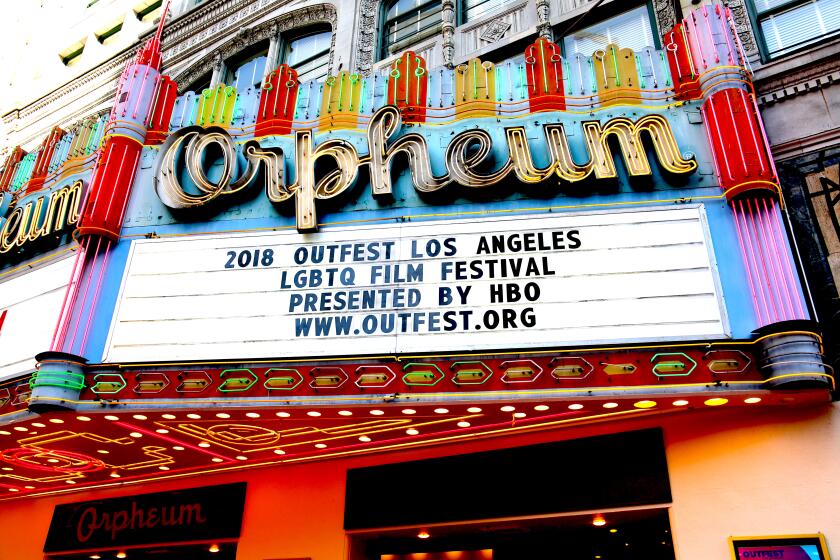A tearful premiere, a Sundance sale and the stranger-than-fiction family drama behind Lulu Wang’s ‘The Farewell’

Awkwafina discusses her personal connection to the drama ”The Farewell” at the L.A. Times Studio at Chase Sapphire on Main. Plus: Director Lulu Wang opens up about the real-life inspiration for the movie and the “Crazy Rich Asians” star’s “raw” audi
Reporting from Park City, Utah — It’s Monday at the Sundance Film Festival and filmmaker Lulu Wang is wiping away happy-sad tears in the midst of the most pivotal 72 hours of her life.
It has already been an extraordinarily emotional few days. Strangers keep coming up to Wang on the snow-covered streets of Park City after seeing her film “The Farewell,” about a struggling New York City artist (“Crazy Rich Asians” scene-stealer Awkwafina) who travels to China for a family reunion to visit her dying grandmother.
They thank her and they cry, which in turn makes Wang cry because, as her immigrant mother reminded her often six years ago during the stranger-than-fiction events that inspired the film, she’s overly American and therefore terrible at hiding her emotions.
Wang and Awkwafina, who makes an impressive dramatic turn in her first lead role, became two of the buzziest talents of the festival after “The Farewell” debuted in the U.S. dramatic competition on Friday, garnering rave reviews and selling out subsequent screenings. Even Wang’s most important critics gave their approval at the world premiere.
As the lights came up on a still-sniffling crowd inside the packed Eccles Theater, the beaming filmmaker strode onstage to a standing ovation. During the Q&A an audience member asked what her parents, in attendance, thought of the deeply personal film. After a beat, her dad shouted from his seat: “Pretty good!”
“That’s a high compliment,” Wang says with a laugh now, remembering the moment. “That’s like an Asian A+! Pretty good.”
In addition to processing the life-changing events of the past few days, on the morning of our interview the trades have just reported that a deal is in the works with A24 winning a bidding war to buy “The Farewell” for a reported $6 million-$7 million. It’s a huge moment for Wang, one of several female directors of Asian descent who have dominated this year’s festival.
But Wang is wrestling with more than the usual nerves, joy and excitement of Sundance deal-making.
When she made that real-life fateful trip back to China to see her 80-year-old grandmother, whom she affectionately calls Nai Nai, it came with one monumental complication: Worried that she would be crushed by the news of her condition and against Wang’s objections, the family agreed not to tell their beloved matriarch of her own diagnosis.
Making “The Farewell,” her second feature to date, in and around her grandmother’s home, with Nai Nai’s own sister playing herself and the family’s biggest secret at its center, is in a way Wang’s response to an impossible situation made even more complex by cultural and generational disagreements.
And as the film rides the buzziest wave of one of the most prominent film festivals in the world, her relatives back in China have yet to see it.
FULL COVERAGE: 2019 Sundance Film Festival »
Wang was 6 years old when she moved from China to Miami with her writer mother and diplomat father. Growing up in the States far removed from the extended family overseas, she kept close with her Nai Nai as she grew up, translating her love for writing into a hopeful career as a filmmaker.
But like many children of immigrants who come to America hoping their sons and daughters will find more opportunity and financial stability than they had, Wang worried that her career path disappointed her parents.
“For the longest time it always felt like my choices were hurting them,” says Wang. “It pained them to see me struggle, yet the irony of that is that they struggled to get to the U.S. for a better life.”
It helped when she directed her 2016 first feature, “Posthumous,” an indie screwball romantic comedy starring Brit Marling and Jack Huston, giving her parents their first glimpse of her filmmaking destiny.
When she started developing “The Farewell” — a saga she first told from her perspective in an episode of “This American Life” that caught the attention of the film’s eventual producers at Big Beach Films — she asked her family if she should even do it at all.
They said, why not? “I think there was a lot of denial, as well,” says Wang. “‘Maybe the film will never get made!’”

She centered the story on an aspiring artist named Billi (Awkwafina), who crashes a family reunion in China after her father Haiyan (Tzi Ma) and mother Jian (Diana Lin) forbid her to come since she’s likely to spill the beans to her unsuspecting grandmother.
Billi makes the trek anyway, returning after decades in America to a neighborhood she only faintly recognizes from her youth. Battling her own conflicted feelings of obligation and guilt, she joins a household of relatives as they convene to say goodbye to grandma under the pretense of throwing a shotgun wedding for a cousin who has been living in Japan so long, he barely remembers his Mandarin.
Anchoring a talented cast is Queens-born Awkwafina, who saw in Billi many aspects of her own life growing up wrestling with the distance between her American identity and her Chinese and Korean roots.
She had just finished filming her breakout turn as the over-the-top Peik-Lin in “Crazy Rich Asians” — and had already heard and loved Wang’s “This American Life” episode — when the role came up.
“I thought, ‘I have to do this. It’s about a girl and her grandma, it’s about going to China,’” says Awkwafina, who made her own pilgrimage in college to study in Beijing. “When will I ever get an opportunity like this?”
Awkwafina on ‘Crazy Rich Asians’ and the power of representation »
Awkwafina grew close to the director and her family as they made the film in and around the actual neighborhood where Wang’s grandmother lived. But rather than merely mimic her director, she was encouraged to find her own version of Billi.
“Lulu’s such a powerful writer, she knows how to encapsulate herself and the family members around her,” she says. “She let me find Billi with my own voice — and one thing she taught me was not to rely on comedy to get a character across. She encouraged me to reach deeper within myself, and that’s something I take to every movie now.”
Billi’s story is at once unique to her Asian American experience and also utterly relatable in its heart-squeezing appraisal of familial love. While much of its dialogue is in subtitled Mandarin, many of the film’s most sublime moments get ample mileage from Wang’s deft direction of comedic beats that require no dialogue to find familiarity in.
“Ten years ago when people would say, ‘Make something in your voice – find your voice and I wouldn’t know how to do that,”’ Wang says. “It’s so easy to say, ‘Find your voice’ — but what does that look like?
“As a human being, as an immigrant, as an Asian American in this country, it requires a lot of confidence in yourself in order to go out and seek your voice, and to believe that your voice has power. I didn’t always have that. Without that confidence, you don’t even know which questions to ask.”
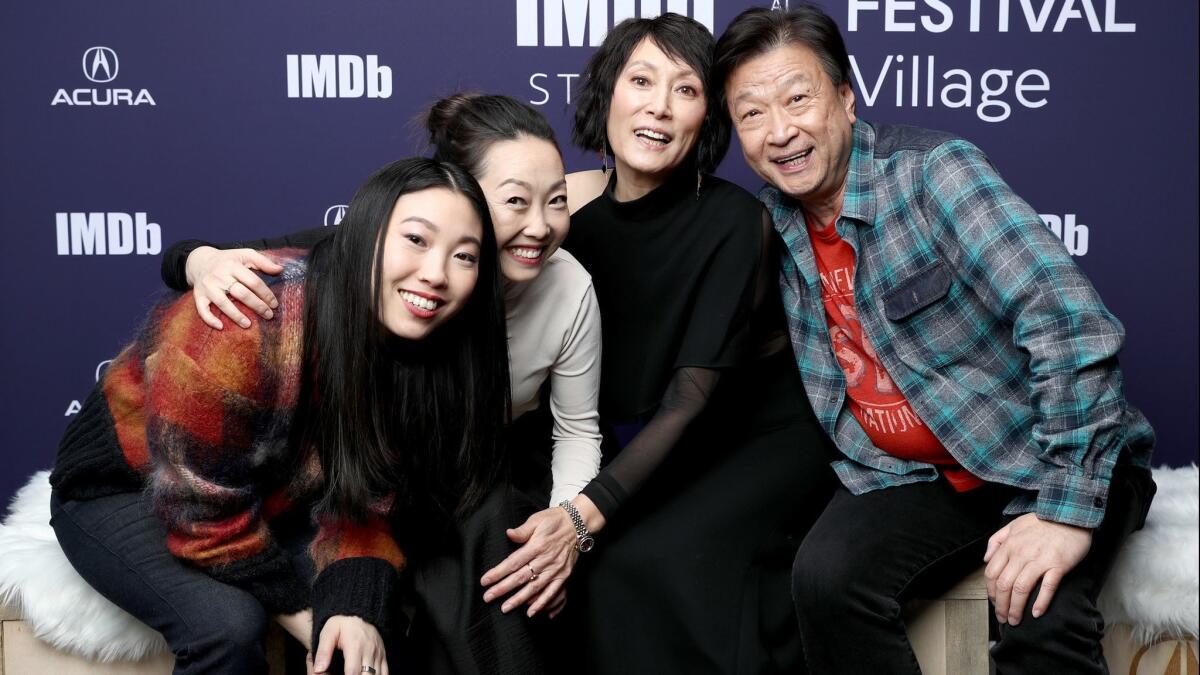
She found the courage to follow her instincts when, still casting for actresses to play her grandmother and her grandmother’s sister with two weeks to go before filming, Wang went to the source and asked her real great aunt Lu Hong, known affectionately as Little Nai Nai, to play herself.
“She’s amazing,” says Wang, who also gave Little Nai Nai’s dog Ellen a cameo in the film. “She walks around in her Air Jordans, she has the hippest style. Having her around was very beautiful but also emotional, because sometimes we would talk about what actually happened.”
Wang wondered if casting Little Nai Nai in the film was unethical; she was, after all, the person in the family who suggested keeping her own sister in the dark about her diagnosis, a practice not uncommon in China. But Little Nai Nai found some catharsis in the role, says Wang.
“When I told her we got into Sundance she said, ‘Are you sure my face didn’t ruin your movie?’” Wang laughs. “That’s also what’s so beautiful. She’s often so self-deprecating and thinks that she’s nothing, is from nowhere, and is nobody. She’s like, ‘I’m not a movie star – why would you want to put me in the movie?’”
Now that “The Farewell” has connected with its first-ever public audience, Wang has shifted focus to ensuring it has a life beyond Sundance.
That’s where upstart distributor A24, the company behind Oscar-winning indie “Moonlight,” comes in.
“It’s been a process of really looking at, what’s the life of this film, how do I want it to go out into the world, and who’s going to best help us to do that,” she says in a follow-up interview two days after the sale, cradling a hot tea outside a bustling cafe on Main. “And also asking myself, what kind of world do I want it to live in — what’s the message that I want the film to send?”
Any independent film will struggle to be seen, but Wang vocalizes the added battle of making sure “The Farewell” is truly seen — not just as a niche film or as an Asian film or a film drafting off of the success of “Crazy Rich Asians” but as a deserving story free of those external labels.
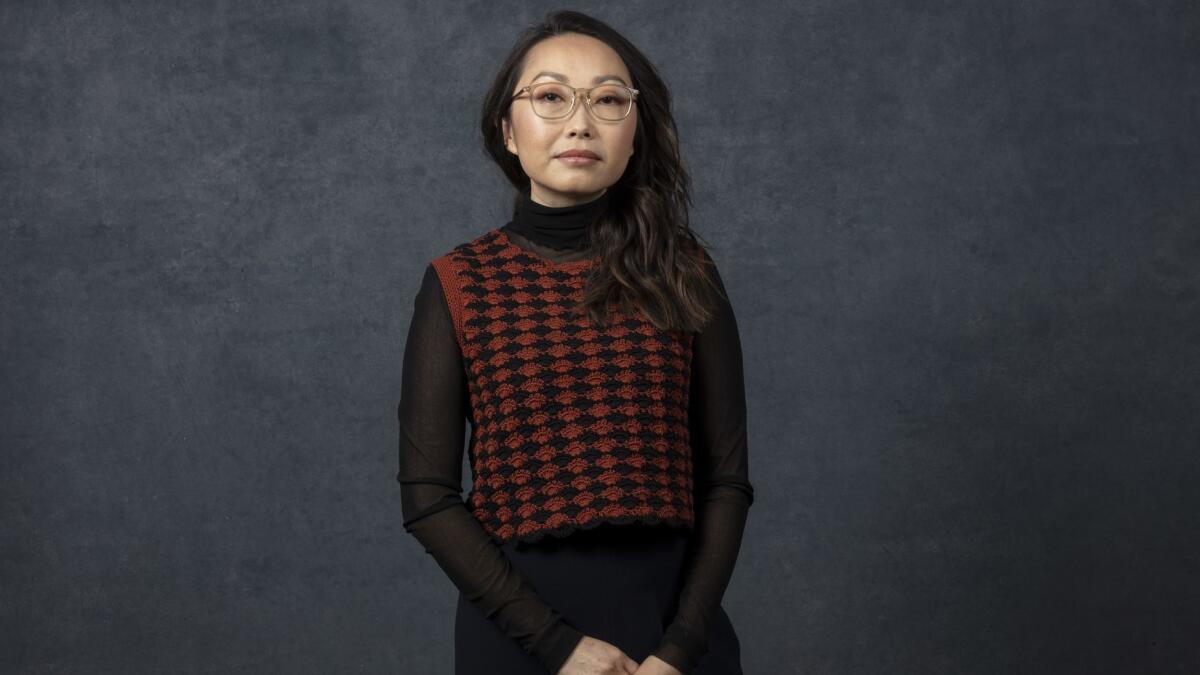
She flashes back to the last 48 hours. Amid a flurry of interest from buyers following the film’s premiere — including one offer reportedly considerably higher than A24’s winning bid — she remembered something her mother used to say.
“She used to compare me to other kids as Asian parents do, and she would say, ‘You know, David promised his mom that when he grows up he’s going to buy her a house… never got that promise from you, right?’ I know she was joking, but it made me feel bad because I knew I wanted to do something with my life that I was passionate about, and the struggle with that is it felt selfish. It felt like I am choosing myself over the ability to take care of my family.”
Faced with a decision over her film’s fate, she called her mother. “I said, ‘Mom – If I take this [higher priced] deal, I can buy you a house.’ And my mom said, ‘Lulu, you will have so much opportunity and abundance in your future. But right now this film is like your baby, and you have to give it the best home. So where do you think your child will grow up with the most joy and the most love?’”
“Americans always talk about family love being unconditional, and I realized that I didn’t feel that way,” she says with a smile, her eyes tearing up. “The love of Asian parents often feels conditional, so having that conversation with my mom was so meaningful because I realized that it’s not conditional.”
Wang is also well aware that a lucrative sale would help send a message about the value of underrepresented voices and stories in the industry, and notes her excitement for the other filmmakers of Asian descent that scored deals and notice out of this year’s Sundance lineup.
In Park City this year, a wealth of inclusive films proved that diverse stories connect. Wang is optimistic that that can continue for “The Farewell” as it embarks on a long journey ahead — one she plans on being on the ground at screenings and Q&As for, to keep up her part of the conversation.
“When people say, ‘Is it a Chinese movie? Is it an American movie?’ I feel like that’s very limiting. It’s like that joke where in America if you eat Chinese food you call it ‘Chinese food,’ but if you go to China it’s just food,” she laughs, thinking back to the prospective financiers who didn’t quite get her or the film when she was first trying to get it made.
“Sometimes America is so great because it brings all of us together, but sometimes it can be so limiting because it puts labels on things. So what gets to be just food? And what is put into this box? I’m just telling a story — my story,” she says, cheekily extending the metaphor. “In what country will I ever get to be just food?”
Sundance 2019 Film Festival: See the latest video interviews


Video: Behind the scenes of the L.A. Times 2019 Sundance photo/video studio
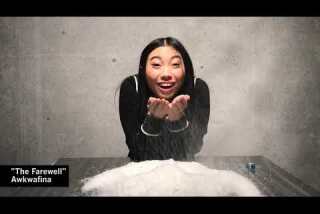
Video: The 2019 Sundance Film Festival Boomerang Supercut
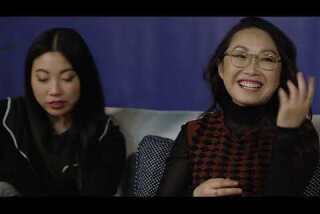
Video: How do you make the most of a small budget?

Video: Cast and filmmaker discuss trusting each other while shooting 'Premature'
3:12
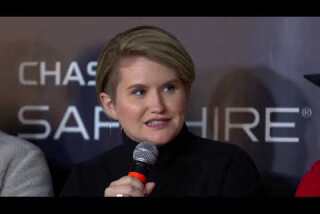
Video: 'Brittany Runs a Marathon' breaks conventions and stereotypes

Video: Jillian Bell is tired of getting scripts about body image issues

Video: Jillian Bell lost 40 pounds for her role in 'Brittany Runs a Marathon'

Video: 'Brittany Runs a Marathon' actors break out of their sidekick roles
More to Read
Only good movies
Get the Indie Focus newsletter, Mark Olsen's weekly guide to the world of cinema.
You may occasionally receive promotional content from the Los Angeles Times.




